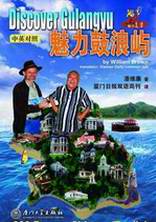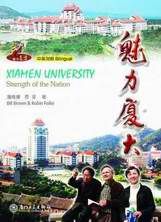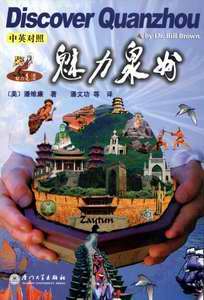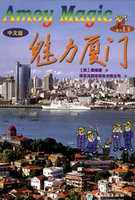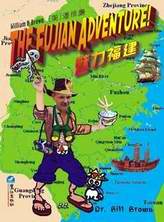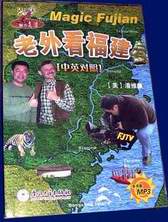![]() Click
to
Access
Click
to
Access
OUTSIDE China
![]() Click
to Access
Click
to Access
INSIDE
China ![]()
TRAVEL LINKS
![]() Xiamen
Xiamen
![]() Gulangyu
Gulangyu
![]() Jimei
Jimei
![]() Tong'an
Tong'an
![]() Jinmen
Jinmen
![]() Zhangzhou
Zhangzhou
![]() Quanzhou
Quanzhou
![]() Wuyi
Wuyi
![]() #1Fujian
Sites!
#1Fujian
Sites!
![]() Fujian
Foto Album
Fujian
Foto Album
![]() Books
on Fujian
Books
on Fujian
![]() Readers'Letters
Readers'Letters
![]() Ningde
Ningde
![]() Zhouning
Zhouning
![]() Longyan
Longyan
![]() Sanming
Sanming
![]() Putian
Putian
![]() Bridges
Bridges
![]() Travel
Info,
Travel
Info,
![]() Hakka
Roundhouses
Hakka
Roundhouses
![]() Travel
Agents
Travel
Agents
MISC. LINKS
![]() Amoy
People!
Amoy
People! ![]()
![]() Darwin
Driving
Darwin
Driving ![]()
![]() Amoy
Tigers
Amoy
Tigers
![]() Chinese
Inventions
Chinese
Inventions
![]() Tibet
in 80 Days!
Tibet
in 80 Days!![]()
![]() Dethroned!
Dethroned!
![]()
![]() Misc.Writings
Misc.Writings
![]() Latest
News
Latest
News
![]() Lord
of Opium
Lord
of Opium
![]() Back
to Main Page
Back
to Main Page
![]() Order
Books
Order
Books![]() Xiamenguide
Forum
Xiamenguide
Forum 
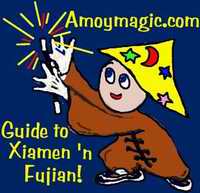
All
contents copyright 2004 by Dr. William
N. Brown
Note: Click Here for several pages of more indepth information about Zhangzhou, including Dongshan Island, Changtai, Longhai Volcano, Lindun Walled Village and Opium Baron Manor, etc.
“Zhangzhou…is one of the most beautiful cities
that I have ever seen in China.”
................Reverend Macgowan, 1889
“Zhangzhou in the Middle Ages was the seat of a great
silk manufacturer, and the production of its looms, such as gauzes, satins
and velvets, were said to exceed in beauty those of Suzhou and Hangzhou.”
................George Phillips, 1888
Nine Dragon River
is so named because someone saw nine dragons playing in it. Why it’s
always ‘nine’ I don’t know. In addition to Nine Dragon
River, Fujian has Nine Carp Mountains, Nine Carp Falls, and Nine Dragon
Falls.
Zhangzhou lies 25 miles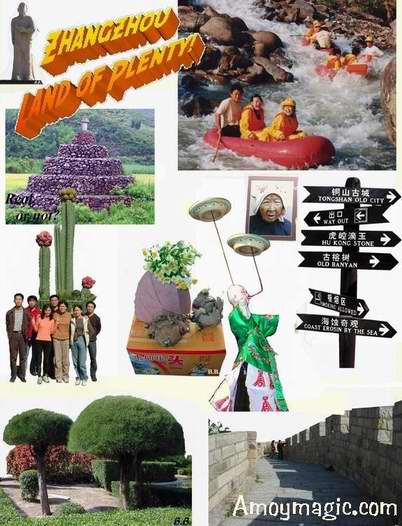 west of Xiamen on the Nine Dragon River, which prevents droughts on Fujian’s
largest plain, hence the nickname “land of plenty.”
west of Xiamen on the Nine Dragon River, which prevents droughts on Fujian’s
largest plain, hence the nickname “land of plenty.”
The Minyue people settled Zhangzhou about 5,015 years ago, give or take
a few months, I was told it was 5,000 years, but that was in 1988), and
it became an imperial prefecture in 686—the same year the miraculous
mulberry tree sprouted lotus flowers in Quanzhou, and the same year that
Xiamen’s Nanputuo temple was built. It was a busy year.
Some scholars argue that ancient Zaytun was Zhangzhou, not Quanzhou. Doubtful,
but excavations have uncovered relics of many ancient religions, including
Nestorian Christianity, so Zhanzhou either had extensive foreign commerce
or a lot of religious correspondence courses.
Zhangzhou was famed for its high walls and gates, magnificent arches,
trees, and fine silks. In 1889, Macgowan wrote of Zhanghou:
“The Chinese have a passionate love for trees and flowers, and consequently every householder had planted some kind of a tree in his courtyard…The people of Zhangzhou were proud and haughty. They were prosperous and well-to-do… They were proud, too, because of the exquisite silks and satin stuffs they could produce. Their looms were famous, and their designs were rare, and beautifully executed.”
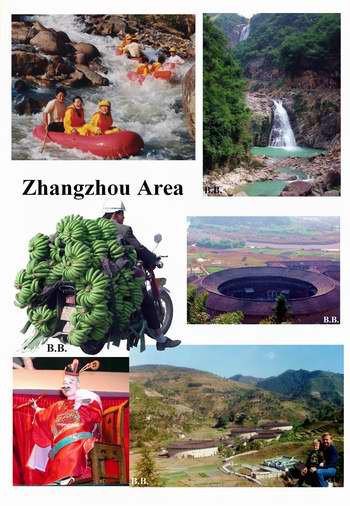 The high walls and massive arches have pretty much vanished, but Zhangzhou
silk can still fetch over $100 USD a yard in Hong Kong, and the passion
for flowers is greater than ever. Hundreds of vendors sell a vast variety
of flowers, shrubs, trees, and Chinese miniature landscapes—or giant
cacti!
The high walls and massive arches have pretty much vanished, but Zhangzhou
silk can still fetch over $100 USD a yard in Hong Kong, and the passion
for flowers is greater than ever. Hundreds of vendors sell a vast variety
of flowers, shrubs, trees, and Chinese miniature landscapes—or giant
cacti!
“That cactus is real!” my students argued.
Impossible. Even in Zhangzhou nothing grows that well, I thought. So I
pulled Toy Ota over and checked it out for myself. The verdict? Check
it out for yourself. And then visit the nearby “100 Flower Village.”
About 2.5 km south of Zhangzhou, this was the home of the original flower
children!
100 Flower Village was founded about 500 years ago when
a descendant of the famous philosopher Zhuxi fled to Zhangzhou to escape
political persecution. One night he fell asleep, stone drunk, and had
a dream of flower fairies descending from heaven. They danced, and sang,
“Growing flowers brings eternal happiness, enjoying flowers brings
long life.” He awoke, named the place Changfu (Lasting Happiness),
and his descendants have been growing flowers ever since and now have
over 20,000 kinds of flowers!
Water Sprite Flower (narcissus) is Zhanghou’s most
prized flower, and their secrets for cultivating it ha3 been closely guarded
for centuries.
Zhangzhou’s Magical Little People Chinese, like
people the world over, tell tales of magical little people—but in
Zhangzhou they are for real! The 40cm (on average) folk are Zhangzhou’s
famous glove puppets!
I like Quanzhou’s marionettes. They’re about the only people
on the planet who know who’s really pulling their strings. But glove
puppets?
Glove puppets sound more like a child’s toy to me. But in the hands
of skilled puppet masters, these ancient works of art spring to life.
One takes a toke on a long pipe, and then blows smoke out his mouth. Another
pours him a cup of tea with a steadier hand than I’ll ever have—and
the liquid goes right into the pinky sized cup. Puppets did the dragon
dance almost as well as the Xiamen International School students’
legendary performance. And they performance astonishing comic routines
and acrobats—throwing spinning plates into the air and catching
them on two poles, or juggling a barrel on their heads, tossing and flipping
it—or tossing each other!
No Puppets & Fireworks Chinese seemed amused at the
childlike delight I took in the puppets antics. One told a friend, “It’s
because America doesn’t have puppets like this.”
He reminded me of the Longyan farmers who saw us happily firing off half
a ton of fireworks. One sagely told another, “Look how excited they
are! They don’t fireworks outside of China, you know.”
For the record, Americans can buy fireworks, but in China they don’t
cost an arm and a leg. And we have hand puppets—but I doubt we have
the magic that brings them to life. Eventually I went behind the stage
to reassure myself the creatures were not alive.
Be sure and take in a Zhangzhou puppet show—and take home a handcrafted
puppet for only 100 Yuan or so. Or arrange a Zhangzhou puppet show in
Xiamen! Contact the Natural Sciences Museum’s Mr. Hong Ming Zhu
to arrange puppet performances, or to purchase a puppet like the ones
in the photograph below.
Phone: 206-9933, or 897-3331. Mobile: 13666008151
Address: 2 Zhong Hua Rd Gulangyu Islet.
Zhangzhou Sites Zhangzhou has 760,000 inhabitants in
nine counties covering 12,600 square km. But the city modestly boasts
only 33 scenic spots, as compared with Quanzhou’s claim to 2,000.
My favorites include the 800-year-old Tiger Crossing Bridge (built where
a tiger successfully crossed a stream), Hongjian Village (ancestral home
of former Filipino President Corazon Aquino, the Song Dynasty Zhao Family
Palace, Donghai Island, Changtai (China’s kayaking capital), and
Longhai Crater (which has an excellent beach, with sand like wet silk).
Tianbao Banana Plantation Just 15 km from Zhangzhou is an endless plain
of banana trees, and tin the roadside Banana Mall, dozens of small stalls
sell tens of thousands of kilos daily of the famed Tianbao bananas. We
took home an entire stalk of bananas, to our cat’s delight. Two
field mice had nested inside.
Liudoushan Tropical Rainforest
If you’re up for a good ride, this breathtaking rainforest is about
75 km from Zhangzhou city. But take an umbrella, because it has a 2,000
mm annual rainfall!
The World Forestry Conference recognized this unique 20-plus hectare reserve
as one of the world’s rare, virgin rain forests, abounding in rare
animals like the pangolin (an ant eater). The thousands of plants include
over 700 ‘rare medicinal herbs.’ Of course, it seems to me
that just about everything is medicine for something.
Twenty Two millions years! Chinese claim that scientific
records prove that is how long LongHai Crater has been around.
Only Chinese could keep records for 22 million years.
Longhai Crater is across the bay from Xiamen, and down
the coast, past the South Taiwu Mountain with the giant footprint on the
peak. On the way I like to make a quick pit stop at the quaint hamlet
of Gucheng (Ancient Wall Village), with its rounded arches, quaint wooden
doors, sparrow-tailed eaves, and Minnan roofs.
For such a small village, Gucheng has a remarkably large catholic church.
The original was built in 1877, and the new building, completed in Feb.
1999, has white tiles with pink and blue trim, and green tiled letters.
When I took photos several grannies invited me in for tea and a tour.
White Beach Ancient Crater does indeed
have fine white sand, as if it spilled straight from some heavenly hourglass.
It felt like wet silk between our toes. And the waves were strong enough
to beach1 our boogie boards2—to the dismay of local fishermen, who
passed us in picturesque crafts fashioned from bamboo and chunks of Styrofoam
bound with rope, or sailed Minnan boats painted red, green, yellow and
blue (rather Tibetan, I thought). I was surprised that many of them don’t
know how to swim, and were worried about the Laowai in the water.
Entrepreneur A 12-year-old politely badgered us to buy
warm Jianlibao soda. I bought three cans, and he posed proudly for a photo
in his Chinese Huck Finn straw hat, holding his wares. Then he pushed
warm watermelon, rental umbrellas, a restaurant with TV and karaoke, and
hotel rooms for the night.
We explored the volcano after our little friend had emptied our pockets.
I was fascinated by the fields of geometrical black basalt crystals, which
had formed deep within the earth and shot to the surface during eruptions.
On the highest point of the crater a stone held down an offering of Buddhist
“Hell money,” perhaps to discourage the volcano god from blowing
his top.3
Dongshan Island
One of my students was a native of Fujian’s second largest island,
so I loaded a sixpack of students into Toy Ota and we set out to explore
Dongshan.
Political Tongue Twisters! On the road south we passed
Yuanxiao Town, where for 500 years the locals have criticized the government
with tongue twisters and poems in the local Minnan dialect. When retired
Red Army soldiers wanted more money, they surrounded the government office,
wrote big character posters, and recited tongue twisters and poems. One
story tells of everyone covering their ears and fleeing when a man ignites
a gigantic firecracker. But it just fizzles out, not with a bang but a
whimper. The moral: some officials talk a lot but do nothing.
Sounded just like American politics to me!
The Tenfu Tea Depot boasts the largest tea museum in
the world, as well as the largest stone teapot. I took great pains to
get a photo that looked like I was drinking from the pot—and then
lost my entire disk of photos—including some irreplaceable photos
of boat builders on Dongshan Island. As soon as I have time I’m
heading back to Dongshan again.
But the real attraction at the Tenfu tea depot is the scenery! Across
the highway are ranges of the peculiarly Chinese mountains that jut like
giant crystals in every direction, as if designed by committee. Alas,
those photos went to pot as well. Next time!
“One should eat to live, not live to eat.” Moliere
(1622-1673)
“Moliere never had Chinese food.” Bill Brown (1956—?)
Dongshan Chow Chinese are not only the best cooks but
the best diners, so of course our first stop on Dongshan was a village
restaurant. During dinner my students argued the merits of various seafood.
One guy said he preferred six-legged octopi to eight legged ones. A girl
said that during the winter, male crabs are far superior to female crabs.
They asked my opinion on seafood and I said I prefer fish filet sandwiches,
easy on the mayonnaise.
One student saw a cute puppy outside and sighed. “Oh, for some dog
meat. The very thought makes my stomach move.”
“It makes my stomach move too,” I said. Suppertime, Lassie!
Chopstick Wars! A student dropped his chopsticks and
a Sanming girl exclaimed, “That means you’ll have a guest.”
“No!,” a Fuzhou student said, “it means you’ll
be beaten!”
My Quanzhou student laughed. “No, it means you pay the bill!”
But what else would one expect from a son of ancient Zayton?
Classroom discipline was a hot topic at lunch. One girl
said that students used to beat students who did not do homework. Or make
them stand in the corner. And she added, a mite smugly, “Laws prevent
that now. If you teachers buy a bamboo to beat us, we will buy a law book!”
“Please do!” I said. “I’ll assign it for homework
and test you on it!”
Sichuan Tourist Tires! We set out to explore after checking
into the Dongshan Hotel, but the Sichuan student said, “I’ll
just take a nap.”
“You’ve come all this way to nap?” I asked.
The other students laughed. One said, “Sichuanese’ idea of
tourism is to check into a hotel, eat, play mahjong, sleep, and go home.”
“What’s wrong with that?” my Sichuanese said, yawning
deeply.
So we wished him sweet dreams and set out.
Sunken Palaces and Ghosts Dongshan’s shores are
haunted, according to imaginative locals. They say that robbers were executed
on the beach, and now when typhoons approach, you can see the robbers’
ghosts running up and down the shore, sabers drawn.
Endless white beaches fall off so gradually that at low
tide one can walk hundreds of meters—almost to the magical site
of the last Ming Emperor’s sunken palace. Locals say that the very
day the Mongols killed the last Ming Emperor on Hainan Island, his Dong
Shan palace sank into the sea and a black stone rose in its stead.
Supposedly you can see the stone if the tide is low enough. My Dongshan
student had never seen it, but he found a small black rock and exclaimed,
“Maybe it’s part of the Emperor’s stone!”
A live horseshoe crab excited one student. “These were on the earth
before dinosaurs,” he said. “They’re a protected species
in China.”
“But I’ve seen them in restaurants,” I said.
“Yes,” he said. “They’re excellent.”
In the longer scheme of things, Chinese will no doubt outlive horseshoe
crabs, and everything else.
Incensed The beach was dotted with smoldering incense
planted in small mounds of rice and greens. These were offerings to local
gods for the fishermen’s protection and prosperity. Some find prosperity
by marrying their daughters to soldiers holding war maneuvers on the island.
My student said, “Soldiers get all the prettiest girls.”
Seaweed ‘R Us! Three men were welding an iron frame
for one of the local wood and styrofoam boats. A few feet away, a Zhangpu
man crouched beside a bamboo frame, seeding it with seaweed, which takes
ten days to harvest.
Colorfully costumed Zhangpu girls stacked the heavy frames and carried
them to a small boat waiting just offshore.
Shoestring Seaweed The seaweed enterprise
was a shoestring operation5 if I’ve ever seen one. It was just two
very small adobe huts, and the girls were using an ancient washing machine
to spin dry the seaweed! But it worked, I suppose, and the laobans (bosses)
were successful enough that they sit back at their ease, drinking tea
and smoking, and barking orders.
There must be a school somewhere that teaches bosses how to be bossy.
I asked the two laobans if they were also from Zhangpu. “Of course
not!” one snorted. “I’m a Dongshan Islander!”
At least now I knew the local pecking order!6
The Stone Templ, at the top of stone steps on a hill
in town, was named after the large stone in the courtyard. One student
claimed it resembled a lotus. “No, no!” said another. “It
looks like a bed. What do you think, Professor Pan?”
“Big rock, perhaps?” I said. And having settled the dispute,
we set off for Dongshan’s #1 site, the ancient Tongshan (Copper
Mountain) Castle, and the magnificent gardens of Guandian Temple.
Mischievousness pays off sometimes! The
Large statue in Tongshan is of a man who as a child was so mischievous
that his father forced him to live and study in a cave on a small island
nearby. Maybe I should try that with my own two sons, because the son
grew up to be the last prime minister of the Ming Dynasty. Then again—maybe
the mischievous prime minister was why the Ming ended! I’ll have
to think on this.
Math or Medicine As Toy Ota crawled up the narrow alley that was once
Tongshan’s main street, we came upon a funeral. It seems everywhere
we go we run into funerals, and I said to one student, “China has
the most dead and dying people in the world.”
“That’s not true!” he argued. “We have great medical
care!”
“It’s mathematics, not medicine,” I said, and his feathers
slowly unruffled7.
Stone steps from the top of the ancient wall led to the jagged shore below,
and students drank sweet spring water from a cave where a tiger once dwelt.
It’s called “Jade Drip in Tiger’s Mouth Cave.”
After my students had their fill of green saliva (what else drips in tigers’
mouths?), we ascended the temple walls and entered the grounds, with their
delightful with their delightful flowers, shrubs, and odd umbrella shaped
trees, and … the father of fortune cookies?
Chinese Fortune Cookies The sweet, bow-shaped sugar cookies
that finish off meals in Western Chinese restaurants originated not in
China but in California! (Either San Francisco or Los Angeles, around
1918). So we could call them California Fortune Cookies—but the
idea behind them is certainly not alien to Asia!
Several students had their fortunes told in the temple by drawing from
a jar a stick that was then matched to one of the 100 stories on small
strips of paper. One student’s tale was about the furious king of
heaven locking a fairy in a mountain because she married a mortal. Her
sons grew up in hardship, eventually stole the deity’s axe, and
used it to break open the mountain and free their mom. The moral: “Persevere
and you’ll succeed.”
Another student drew a convoluted story about someone shooting down an
army messenger pigeon. The moral, he was told, was: “Persevere and
you’ll succeed.” He said, “Same fortune four years in
a row, so it must be true!” Fortune cookies.
The saliva sipper, Inway, declined having his fortune told. He said, “Some
people always ask for things or ask too much. I prefer to just pay my
respects… though in our home temple I’ll make a few requests…”
The Wind Rocking Stone wouldn’t budge, even when we lay flat on
our backs and pressed it with both feet. What we needed, I suuposed, was
half a dozen hefty German sailors like the ones that sent Xiamen’s
Wind Rocking Stone tumbling down the mountain in 1908.
Stone Monkey Smoke? A brass plaque before a massive cracked boulder proclaims
that on May 31st, 1992, at 3:32 P.M, the rock cracked, smoke poured forth
like a stone monkey, and an 80-pound python emerged.
I can handle the python part. They’re a dime a dozen in Fujian8,
but a stone monkey of smoke? Sounds to me more like someone was stoned
9 on smoke.
Museum to Fragmented Families This sobering memorial
commemorates the hundreds of women whose husbands were kidnapped by Chiang
Kaishek’s army when it fled to Taiwan. Nearly the entire male population
of some villages vanished. Most of the women never remarried, though the
husbands in Taiwan invariably found new wives.
Decades later some returned to Dongshan Island to visit their former families,
many with their new wives and children in tow.
I was horrified that the West stood by while so many families were destroyed.
Hopefully, the world is small enough today that such barbarities do not
go unnoticed—or conveniently ignored.
Our last stop on Dongshan was the mountain where Koxinga stood while training
his navy. It offered as good a view of the harbor as Gulangyu Islet’s
Sunlight Rock—but at least on Dongshan you don’t have to sell
your firstborn to afford it. It’s free (or even half of that).
What a Gas!10 On the way home I stopped to refuel at
a Petro China. Four girls in green mini skirts greeted me and one proffered
a stainless steel tray with four oranges, a bottle of shoe polish, and
a Chinese calendar. “For you,” she said.
“Wow!” I said. “Gas stations used to lure business with
just a tissue box or a bottle of mineral water.”
She looked surprised, and hurried away. As I was driving off she came
running back. “For you!” she said, and handed me a box of
tissue and a bottle of mineral water. Next time I’ll set my sights
higher.
In the meantime…let’s head to Changtai, “Xiamen’s
Backyard,” and Kayaking capital of China!
Changtai—Xiamen’s Backyard
Free of frogs 328 days a year! Or so claims the brochure.
They also boast average raindrops of 1.5 meters. But I finally figured
out the English brochure really meant frost, not frogs, and rainfall,
not raindrops. Even so, Changtai is an amazing place, regardless of rainfall
or frogs.
Stone Age pygmies settled Changtai, but later the tattooed folk were displaced
by the She minority, who appreciated such a mild climate (free of frogs?)
that locals can reap three harvests a year of dozens of varieties of grains,
vegetables, and some of China’s best citrus.
General Chen Yuanguang led an army from Henan to Guangzhou,
then up to Zhangzhou, and finally to Changtai, which became a county in
AD 955. General Chen brought not just military might but also central
plains culture, technology, and arts. The She that had not already fled
intermarried with the Han, though Changtai’s Banli remains a She
village to this day.
Chinese not only have a long history, but also a memory longer than an
elephant’s. A Zhangpu village forbids marriage to anyone named Chen
because of a disagreement with General Chen—1000 years ago. And
a Shanghang hamlet forbids marriages between a Liu and a Wang because
a Wang tried to usurp a Liu’s throne—over 2,000 years ago.
I hope I never get on any local’s blacklist!11
Zhangli—The Light Side of a Dark Decade! I set
out for Changtai in Toy Ota after first picking up my two guides for the
day: the acclaimed writer Mr. Zhangli and historian Mr. Gongjie.
Zhangli had a special place in his heart for Changtai, which we visited
many times together. The irrepressible Zhangli was the image of health,
and I had no idea it was my last trip with him. He passed away two months
later—but he last left his mark on many lives, including my own.
Like millions of urban Chinese, Zhangli was sent to the countryside during
the Cultural Revolution, but nothing could break his sense of humor. He
had endless hilarious stories about the light side of a very dark decade.
Zhangli eventually returned to labor as a lowly dockworker in Xiamen.
After writing stories in his spare time he was hired by XMTV. Over the
years he wrote five TV series, (the author played the bad guy in one),
one movie, and six books. He received 33 awards for writing, including
7 national level and 15 provincial. He most enjoyed writing his highly
acclaimed children’s book. “It was easy,” he said. “It
just flowed, and I finished it in only two months. Children laugh at it,
and enjoy it.”
For all his brilliance, Zhangli was a child at heart, and best illustrated
to me the truth of the Bible verse, “Except ye become as children,
ye shall not enter the kingdom.” I trust he’s there now.
Xiamen Museum Curator. Professor Gongjie also accompanied us to show us
what he believes is a newly recognized fifth style of Fujian architecture—the
Stone Fortress (shibao). It is hidden away so deeply in a remote Changtai
valley that we’d have never found it without him—or perhaps
never have come back! For as in Middle Earth,
The Road goes ever on and on
Down from the door where it began.
Now far ahead the Road has gone,
And I must follow if I can,
Pursuing it with eager feet,
Until it joins some larger way
Where many paths and errands meet.
And whither then? I cannot say.
J.R.R. Tolkien, “The Lord of the Rings”
Changing Changtai In my eyes every Road or Sea is a path to new adventures—even
if I’ve been up that road a dozen times. And as Toy Ota forged west
on the 319 National Highway toward Changtai, I imagined myself once again
driving Toy Ota to the otherworldly Himalayan heights of Tibet. Someday.
But today my meandering was more mundane. Just west of Jiaomei town I
cut a right and ascended the narrow road separating Xiamen from ancient
Changtai—and found adventure in my own backyard!
I thought I was in the absolute middle of nowhere until I saw a highway
worker in an international orange safety vest pulling weeds from between
the giant boulders piled helter-skelter on the mountains. It reminded
me that in China there is no ‘nowhere,’ for every place in
the country has been inhabited and explored for the past 5,015 years.
The Wenchangge Pagoda hailed us from a distance as we approached Changtai.
It was first built during the Tang Dynasty, and has been struck twice
by lightning. It burned down during the Ming Dynasty and was rebuilt in
stone. The stone eventually collapsed, and it was rebuilt yet again in
the year 2000. Given its record—I’ll admire it from a safe
distance.
Modern, clean Changtai City is worlds apart from the
backward hamlet I first visited several years ago. Only a few years ago
the river was a dark, smelly channel for local factories’ pollutants.
Today, the pristine river is China’s Kayaking Capital!
Like Xiamen’s former mayor Hong Yong Shi, Changtai’s young
magistrate, Mr. Yang, determined to avoid the West’s “pollution
then solution” approach to development. He closed many polluting
factories and set strict controls on the rest, and restricted the quarrying
that was scarring the scenic mountains that have inspired centuries of
poets and artists. Where only five years ago decrepit buildings once lined
the river, there is now a broad park and a clean white pavilion.
Closed-Cycle Recycling Changtai recycles waste from 30,000
dairy cows. Cow urine provides methane for cooking and lightning, and
manure provides fertilizer for the mushrooming fruit and mushroom industries.
Reforms and tightening the belt were tough at first, but today Changtai
is a model for other counties that seek to balance development and ecological
preservation.
“Shorts and sandals!” Zhangli exclaimed, as we set out on
a hike to Baizhangya Falls.
“But you said we were walking to the waterfall!” I said.
“That’s true,” Zhangli said, and he laughed. And when
they hauled out hoes, machetes and pickaxes, I knew we were doomed.
We hacked more than hiked across hills blanketed in bushes
with beautiful white flowers—and enough thorns to make us regret
wearing shorts. And the trail’s rough rocks cut into our thin sandals.
But the lush valley was beautiful, and the turquoise river roared over
giant polished boulders flung across its path. It was a river rafting
paradise. But there was a serpent in paradise.
A green bamboo viper slithering through ferns half half
a meter off the trail blended in so well no one else saw him. I motioned
to the others, and pointed. One guy almost fainted, but another took videos.
The viper eyed us intently, but fearlessly. He was one of nature’s
deadliest snakes, and knew it.
Power from On High A hydroelectric plant in this natural
grandeur jars the senses about like a crayon drawing in a Van Gogh exhibit.
This eyesore lies on the disputed bordern between Anxi and Changtai counties,
and is the reason that Baizhangya falls rarely falls anymore. Unless tourists
are coming, Anxi diverts the flow and this mighty 70 meter falls looks
more like something Mother Nature delegated to a husband with prostate
problems.
The Taiwanese who invested $250,000 USD in the falls for tourism was fit
to be tied.12 “This falls is unique,” he said. “The
rock at the bottom looks like a leaping carp, and when the water falls
heavily, the mouth appears to open and shut. I can show you the video!”
I too was indignant. “I should draw a cartoon of tourists visiting
a dry falls, with Anxi people above turning off the faucet.”
But every coin has two sides—and an edge. Susan Marie said, “You
could also draw Changtai tourists enjoying the falls and Anxi peasants
reading by candlelight.”
`I hope to visit the falls again someday, but I’ll phone ahead first
to make sure the water’s turned on.
From Changtai city we took the road’s north fork
(because there wasn’t a chopstick) and insinuated ourselves deeper
into remote narrow valleys that harbored tigers and foxes right into the
1960s. Changtai is still a haven for rare pangolin (a scale-covered ant
eater, like an armadillo), 100-year-old giant tortoises, wolves, mountain
goats, wild boar, and plenty of snakes.
An odd round pagoda like a Mongolian yurt has a Hindu-looking tower above.
I was told it was built by the Mongol conquerors, who I was told were
influenced somewhat by Tibetan Lamaism.
A small tree and sign in the middle of the road announced the humble hamlet
of ShanChong.
A villager boasted, “This 700-year-old tree is Fujian’s biggest!”
I said, “I thought the biggest trees were in West Fujian.”
He was undaunted. Grinning, he said, “Well, it’s the biggest
to us anyway.”
Mountain Goat Stone Fortress (ShanYangLou) was built
in 1623 as a defense against the “midget barbarians” (the
rather derogatory Chinese term for Japanese pirates, but its no wonder
they bore little love for them).
October 16th, 1580, the Japanese attacked. Over 1000 locals created the
Prosperous Peace Army (Fu’anjun), which was to fight off Japanese
attacks for over a century.
The three story Stone Fortress’ walls are 1.6 meters thick at the
base, 90 centimeters at the top, and 6 meters high. The holes in the wall
were for cannon that shot jagged bits of metal.
Granny acted like foreign devils dropped by every day! She grinned, adjusted
the baby strapped on her back, and said, in the local dialect, “M’dei!”
Have some tea! (The English word “tea” comes from the Minnan
“dei.”).
Like a magician casting spells, Granny waved her arms about as she gave
us the penny tour of the cluttered courtyard and old stone house. She
led us up the narrow wooden stairs to the upper loft. Almost everything,
from cradle to furniture, was handmade.
Wooden farm implements, darkened with age, looked like museum exhibits.
Their design probably hasn’t changed in 1,000 years, but there’s
no point in reinventing the wheel. Their ancient implements do the job.
So does their homemade dump truck!
We bid granny and company farewell, then headed for Lindun town. It was
close as the fly flies but we had to go around a mountain to get there
so it took almost an hour.
Lindun Town Our first stop in Lindun was the hot springs
restaurant. It was run by Mr. Lin, which was no surprise since most Lindun
people are surnamed Lin. The foyer had a large painting of the Lin in
charge back during the Ming Dynasty. Before the painting was a round wooden
table with offerings of incense, cups of tea, nuts, flour-coated peanuts,
and a bottle of mineral water to quench the extinguished gentleman’s
thirst.
Lindun Lunch included fat noodles, similar to Japanese
Udon noodles. Even the pronunciation, “oudong,” was similar.
It turned out they were imported from Japan. How ironic—importing
midget barbarian noodles!
Wild mountain plants and “green” veggies (no pesticides or
fertilizers) figured heavily on the menu. Green vegetables are so popular
now that many towns have ‘green markets,’ and Wuyi Mountain
even has an annual “Green Food Exhibition.”
We enjoyed fish with green peppers, pork, long mussels, clay pots of bitter
melon and large intestines (which took guts to get down), and boiled mountain
goat that was tougher than shoe leather (sole food, perhaps). I could
not sink my teeth into it—but neither could anyone else. This really
got the host’s goat, and the goat was sent back to the kitchen.
Tofu I love tofu--fried or fried, oiled or boiled, I’ll
eat it. But Spirit Mountain Tofu (Shenxian Doufu) turned out to be not
tofu but beans and potatoes, which a Hunan factory processes into a delightful
flowery, chewy, tofu-like substance.
While I feasted on fake tofu and other delights, Zhangli regaled us with
his humorous Cultural Revolution era tales.
3 = 12, sometimes! Or so said Zhangli. When he was sent
to the countryside, peasants met him at the bus stop, grabbed his bag,
and said follow us, then lead him up a narrow mountain trail.
“How far?” Zhangli asked.
“About 3 li (about ½ mile).”
An hour later Zhangli asked, “How much further?”
“About 3 li,” they said. And later he was told a third time,
“About 3 li.”
It turned out to be 12 li, not 3. The farmers were afraid that if Zhangli
knew the trust from the outset he’d have balked, so they didn’t
tell him the truth until he was too far to turn back.
Four She Surnames. Zhangli said the She minority got
their four names in this manner. A maiden married a dog, and when the
first child was born, lightning struck—so it was named Lei. The
second child was put in a basket, so named Lan. The third child was placed
in a pot, so named Pan, and bells tolled for the fourth’s birth,
so it was named Zhong.
I’ve not met very many Zhongs, but I guess the name does ring a
bell.15
Nothing to Lose Then Changtai She have a secret totem,
but in 1983, they allowed an outsider to view it after making him vow
not to photograph it or write about it. He broke his vow, they cursed
him with bad luck, and no outsider has seen the secret totem since.
Zhang Li astutely observed, “Back then people probably took it lightly
because they had nothing to lose. Today they might think twice.”
Singing for Supper The host asked me to sing karaoke
but I assured them my singing would bring their lunch up much faster than
it went down. So a cute young lass with short hair and a shorter mini-skirt
serenaded us. I’m not sure if she was an employee or if the boss
was trying to marry his daughter off.
She let out a blood-curdling cry as the tape deck played something like
a cross between Chinese pop disco and Oriental Michael Jackson, but it
settled down into a beautiful folk tune, and everyone asked for an encore.
And then we visited the Opium Baron’s Manor.
The Opium Baron’s Manor, which locals call Big
Intersection Building was built 180 years ago by Xiamen tobacco king LinTianDing.
And he built it to last! One granite block is 6.1 meters long, 60 cm.
wide, and 26 cm. thick. The tall wooden columns are thicker than telephone
poles, and mounted on granite globes. The clay roof tiles are still intact,
though coated in rich green mold. But what time hasn’t taken, vandals
have. The old inscription above the front door had been stolen only months
earlier.
Opium poppies blanketed the hillsides before Liberation
the surrounding hillsides were covered in opium poppies, and from 1940
to 1945, the building was used to process opium.
The opium baron, Yewenlong, was finally executed in 1940 by Chiang Kai
Shek’s KMT (which also sold opium, and was probably just eliminating
competition).
Lindun’s ancient walls still stand—and I’d
had no idea, even though I’ve visited this hamlet 4 times. I’d
have missed them this time as well were it not for my guides, whose tales
breathed life back into the crumbling ruins.
Built to keep out Japanese pirates, they were once six meters high, two
meters thick, and surrounded the entire village. Oddly, there was also
a wall down the middle of town, supposedly separating two factions who
were at each other’s throats except when fighting the midget barbarians.
Two grannies have commandeered the 350-year-old house
once used by a military leader. They greeted us with a hearty, “M’dei!”
“Have some tea!” They were good natured but camera shy, and
they blushed when I stole a few photos.
The Village Gate Godresides in the small shrine outside
the 6½-foot arched southern gate . He was smaller than the incense
sticks and mineral water being offered him, but he seemed happy enough,
with his big grin and a belly that looked 8 months with child.
Concrete Preservation Ideas Two of my companions debated
about how to preserve the beauty of the shady hillock above the wall.
“Concrete tables and benches!” cried one. “Keep it natural,”
cried the other. “Sit on the ground!” The singer from lunch,
who had accompanied us, offered no opinion. She was too busy dancing about
like a little emperor on the warpath, swatting mosquitoes that had been
at her mini-skirted legs ever since we’d left the Opium Baron’s
manor.
Shiftless! When I tried backing down the narrow road
we’d come, I discovered Toy Ota had no gears. It was quite a feat
making it back to Changtai City and Xiamen, up and down and around winding
mountain roads and highways, with no gears. But I made it so no one can
accuse me of being shiftless.16
“You never showed up!” the manager of the Kayak Center complained.
“We had lunch prepared!”
“Sorry,” Zhangli said. “We went straight to the Stone
Fortress.”
“No problem—we’ve saved it for supper.”
“But the van has lost its gears,” I said. “We need to
get—”
“—You need to eat! Then you can worry about gears.”
So we settled down for three hours of unforgettable mountain delicacies,
local tales, and, of course, more Zhangli stories.
Half a dozen giant tortoises roamed freely around the restaurant’s
floor. “Do you eat these?” I asked.
“Of course not! They’re over 100 years old. We’d never
eat anything that old.”
But another man murmured, “Well, maybe the smallest ones.”
Last month, I returned to find all the tortoises gone. “Released
into the wild,” I was told. Go in peace.
“This fish crawls on land!” My host said of one exceptionally
tasty fish. Called ‘manli,’ it crawls up riverbanks by night
and eats birds, frogs and ducklings, leaving a trail of slime to finds
it way back to water.
“We cover the slime trail with flour,” my host said. “This
confuses them enough that we can catch them. Some reach 45 pounds!”
Table Talk For some reason, the thought of eating walking
fish hit me wrong, but the table talk helped take my mind off fishy17
fish. We discussed everything from politics, apples, pears, America, and
girls, to Taiwan and local heroes like Zhuyigui, a duck raiser who fought
the Dutch with Koxinga in Taiwan. Sadly, the Qing executed him. It was
a sad ending for this patriotic duck raiser who refused to duck18 his
duty.
The Ming Dynasty official Tang Tai is another local hero. He missed is
hometown so much that he resigned his high post, returned to Changtai,
and donated all his properties to build educational institutions.
Changtai also boasts the famous Taoist alchemist, Dong Feng, who made
pills of immortality, but they don’t seem to have done him much
good because he’s long gone. It reminds me of a Qing Dynasty tale:
A dying doctor promised a dose of his secret elixir of immortality to
anyone who could cure him. He promised, “My elixir will make you
live for centuries!”
He was asked, “If you have such a miracle drug, why not take it
yourself?”
The doctor replied indignantly, “A good doctor does not write prescriptions
for himself!”
Pythons and Field Mice During a lull in the conversation,
Zhangli whipped out two more tall but true tales:
“I found two field mice in a banana stalk. Country mice are cute—not
at all like dirty city rats. I could not bring myself to kill them. So
I waited until dark, when no one could see me and laugh. I wrapped the
mice in paper, and set them free on top of a mountain. Good thing no one
saw me!”
Maybe not—but now I’ve ratted19 on him.
Python in the Power Station! “One night back in Shanghang,”
Zhangli continued, “The lights started flickering. We found a 16-foot
python wrapped around the power turbine. I shot it in the head with a
rifle, and we pulled it out. I heard that in Vietnam they killed a 29-meter
python with two cows in its stomach.”
A 29-meter python? I found that hard to swallow.
Silent Toasts Chinese meals are usually noisy, with nonstop
cries of Ganbei! (Dry Glass!) But eventually folks started toasting each
other by silently clinking their wine glasses together. My host said,
“When you know each other well enough, words are unnecessary.”
I think my wife Susan Marie would find that hard to swallow.
Tourists literally flip over Changtai’s
2½-hour kayaking trips down the Mayang Xi. Some, like Susan Marie,
flip in it, but lifeguards are always nearby.
The Kayak Center has hosted the International Kayaking
Championship, the First National Kayak Championship, and China’s
9th National Athletics Championship in Kayaking.
Many teams have practiced here, including groups from Germany, America,
the U.K., Brazil, Japan, Indonesia, Thailand, Russia, Belize, and France.
Kayak teams, as well as tourists, stay in the center’s hotel, which
has 50 rooms and a conference center.
The Kayak Center manager said, “In 1900, eight countries attacked
a weak China, and destroyed Beijing. I hope that some day representatives
of those same eight countries will all visit Changtai together, as friends!”
A Driven Driver It’s no surprise the owner of the
kayak center used to be a driver. He’s obviously a very driven man.
He saved 120,000 Yuan to go into business for himself. Today, the kayak
business accounts for only 1/6 of his multi-million Yuan annual income.
Yet, in spite of his wealth, he refuses to pay 3,000 Yuan for Changtai
residency. It would mean giving up his ancestral home. He showed me his
residence card and said, “I’m rich, but I’m still just
a peasant.” As a peasant, his children cannot attend the better
schools of Changtai City, so he sends them to Singapore. His children
are his life, and he joked, “I don’t fear heaven or earth—but
I fear my children.” Fortunately, he is an “Economic Policeman”
on the side, and carries a gun.
I asked him if the rigid rules like residency bother him and he shrugged.
“That’s just the way it is. But some things must change—like
the way Chinese do business. To succeed, you must do all you can, and
go the extra mile. Today the rain wet the ping-pong tables, yet nobody
bothered wiping them off. I did it myself.
“If you see something that needs to be done, do it. Don’t
wait for someone to tell you. If a guest has to be fed, feed them yourself.”
“Times are changing,” he said. “‘Tu yang jie
he.’ Adapt foreign ideas to China to improve and progress.
It doesn’t matter if it’s foreign or local; do whatever necessary
to succeed. That’s how to be successful.”
Black cats or white, Chinese or Foreign, Laowai or Laonei, Changtai is
going for it!
And now, we travel to visit people whom neither Laowai nor Laonei can
ever get in a corner because they live in round houses!
See you in Hakkaland!
TRAVEL
LINKS  Favorite
Fujian Sites
Favorite
Fujian Sites  Fujian
Foto Album
Fujian
Foto Album  Xiamen
Xiamen
 Gulangyu
Gulangyu
 Fujian
Guides
Fujian
Guides  Quanzhou
Quanzhou
 Zhangzhou
Zhangzhou
 Longyan
Longyan
 Wuyi
Mtn
Wuyi
Mtn  Ningde
Ningde
 Putian
Putian
 Sanming
Sanming
 Zhouning
Zhouning
 Taimu
Mtn.
Taimu
Mtn.  Roundhouses
Roundhouses
 Bridges
Bridges
 Jiangxi
Jiangxi
 Guilin
Guilin
 Order
Books
Order
Books
 Readers'
Letters
Readers'
Letters
Last Updated: May 2007
![]()
DAILY
LINKS
![]() FAQs
Questions?
FAQs
Questions?
![]() Real
Estate
Real
Estate
![]() Shopping
Shopping
![]() Maps
Maps
![]() Bookstores
Bookstores
![]() Trains
Trains
![]() Busses
Busses
![]() Car
Rental
Car
Rental
![]() Hotels
Hotels
![]() News
(CT)
News
(CT)
![]() Medical
& Dental
Medical
& Dental
![]() YMCA
Volunteer!
YMCA
Volunteer! ![]()
![]() XICF
Fellowship
XICF
Fellowship
![]() Churches
Churches
![]()
![]()
![]() Temples
Temples![]()
![]() Mosque
Mosque
![]() Expat
Groups
Expat
Groups
![]() Maids
Maids
![]() Phone
#s
Phone
#s
EDUCATION
![]() Xiamen
University
Xiamen
University
![]() XIS(Int'l
School)
XIS(Int'l
School)
![]() Study
Mandarin
Study
Mandarin
![]() CSP(China
Studies)
CSP(China
Studies)
![]() Library
Library
![]() Museums
Museums
![]() History
History
DINING ![]() Tea
Houses
Tea
Houses
![]() Restaurants
Restaurants
![]() Asian
Asian
![]() Veggie
Veggie
![]() Junk
Food
Junk
Food
![]() Chinese
Chinese
![]() Italian
Italian
![]() International
International![]()
![]() Visas
4 aliens
Visas
4 aliens
RECREATION
![]() Massage!
Massage!
![]() Beaches
Beaches
![]() Fly
Kites
Fly
Kites
![]() Sports
Sports
![]() Boardwalk
Boardwalk
![]() Parks
Parks
![]() Pets
Pets
![]() Birdwatching
Birdwatching
![]() Kung
Fu
Kung
Fu ![]() Hiking
Hiking
![]() Music
Events
Music
Events
![]() Cinema
Cinema
![]() Festival&Culture
Festival&Culture
![]() Humor&
Humor&![]() Fun
Fotos
Fun
Fotos![]()
BUSINESS
![]() Doing
Business
Doing
Business
![]() Jobs!(teach/work)
Jobs!(teach/work)
![]() Hire
Workers
Hire
Workers
![]() Foreign
Companies
Foreign
Companies
![]() CIFIT
(Trade Fair)
CIFIT
(Trade Fair)
![]() MTS(Translation)
MTS(Translation)
![]()
Back to Top
